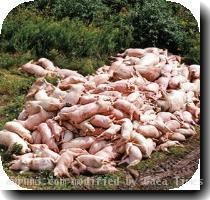Swine flu outbreak suspected in 7 deaths among isolated Yanomami Indians in Venezuela
By Ian James, APWednesday, November 4, 2009
Swine flu hits Yanomami Indians in the Amazon
CARACAS, Venezuela — Swine flu has appeared among Venezuela’s Yanomami Indians, one of the largest isolated indigenous groups in the Amazon, and a doctor said Wednesday that the virus is suspected in seven deaths, including six infants.
The deaths happened in forest villages near Venezuela’s border with Brazil over the past 2½ weeks, said Raidan Bernade, a Venezuelan doctor on a team sent to contain the outbreak and treat the ill.
Bernade told The Associated Press that doctors confirmed one of those who died had swine flu — a 35-year-old Yanomami woman who doctors believe was pregnant.
Six babies, the oldest of whom was about 1 year old, died from similar symptoms, though samples weren’t taken in time to confirm it was swine flu, Bernade said by phone from La Esmeralda, a riverside town at the edge of the vast rain forest territory where the Yanomami live.
He said the victims had fever and coughing at first, and suffered complications from pneumonia.
The deaths were reported Wednesday by the London-based indigenous rights group Survival International, which warned that if not properly contained the virus could spread and cause more deaths among people who are particularly susceptible to disease due to their limited contact with the outside world.
Yamilet Mirabal, the government’s deputy minister of indigenous affairs for the region, told the AP she was informed of six Yanomami deaths suspected of being due to swine flu. She said the outbreak was detected about three weeks ago and health officials have taken precautions since to prevent the illness from spreading.
Venezuelan President Hugo Chavez acknowledged Tuesday night that the virus reached some indigenous settlements, though he didn’t mention the Yanomami or give details.
“Swine flu hasn’t gone away… It was detected in an indigenous community,” Chavez said in a televised speech. “It’s under control now.”
Mirabal said suspected swine flu cases appeared in three Yanomami villages — Mavaca, Platanal and Hatakoa — and a Cuban-trained team of Venezuelan doctors known as Battalion 51 was sent to the area to treat the ill and track possible cases.
Two swine flu cases have been confirmed among the ill, but those people have been treated and recovered, Bernade said.
Doctors identified some 2,000 people with various respiratory illnesses in the zone in recent weeks and took samples from those with serious cases, Bernade said.
He said about 110 sick people are being evaluated to see if they might have swine flu, though doctors believe most have a seasonal flu that appears regularly in the area. He said sick people are isolated in homes, and their numbers have been declining.
“Everything is under control,” Bernade said.
There are an estimated 28,000 or more Yanomami living in communities on both sides of the Venezuela-Brazil border. They have maintained their language as well as traditions including face paint and wooden facial ornaments piercing their noses, cheeks and lips.
The Yanomami often suffer from malaria and also have seen deaths in the past from outbreaks of illnesses such as measles, yellow fever and hepatitis. In many cases, they have become sick after contact with outsiders.
It is unclear how swine flu reached the Yanomami. One possibility is that someone with the virus attended an athletic event in one of the villages last month, Mirabal said. Indigenous people came from all around for the sporting event, which is said to have included soccer — a popular sport among the Yanomami.
Bernade said the first death happened during that multi-day event. He said another possibility is that someone with the virus came with visiting government officials several days earlier.
Last month, Venezuela confirmed there have been 90 deaths nationwide from swine flu, and 1,910 cases of the virus.
Survival International, which supports the rights of tribal peoples internationally, has helped campaign for Yanomami land rights in the past.
Fiona Watson, its research and field director, said she is unaware of any similar swine flu outbreaks in Amazon indigenous communities. She called for urgent action to keep the virus from spreading.
“Survival’s real fear is that this is going to spread rapidly … because the Yanomami are a relatively isolated people,” said Watson, who has visited Yanomami villages previously. “If it gets into these remote communities, by the time people find out it’s likely to be too late.”
Associated Press writers Rachel Jones and Jorge Rueda contributed to this report.
(This version CORRECTS that doctors have identified some 2,000 people with respiratory illnesses instead of more than 3,000.)
Tags: Caracas, Disease Outbreaks, Diseases And Conditions, Infectious Diseases, Latin America And Caribbean, Public Health, South America, Venezuela

